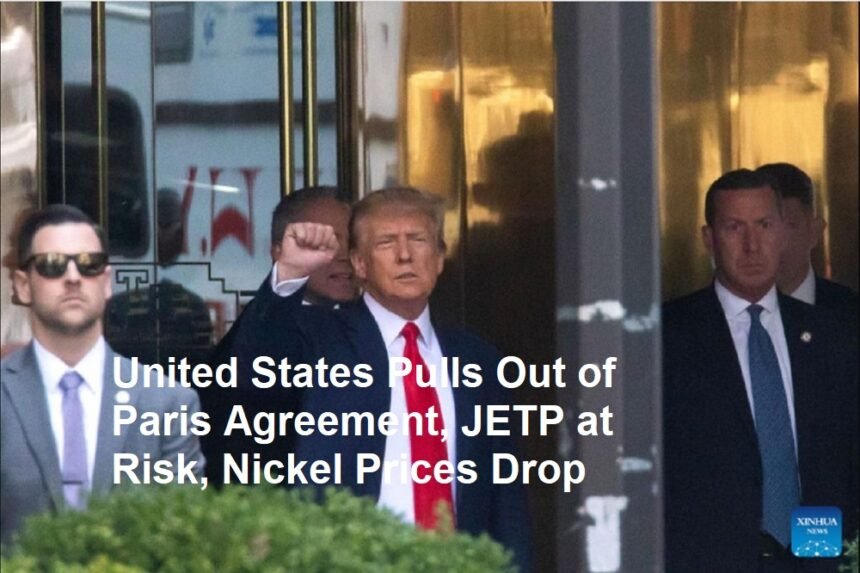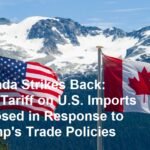In a dramatic shift in climate and energy policy, the United States has officially withdrawn from the Paris Agreement, a landmark international accord aimed at combating climate change. This move, spearheaded by the Trump administration in 2020, has sent shockwaves through global environmental and economic sectors. The U.S. exit from the agreement, combined with ongoing uncertainty surrounding future international climate collaborations, is now threatening the viability of several crucial global initiatives, including the Just Energy Transition Partnership (JETP), and has already begun to impact the prices of key commodities, including nickel.
The Paris Agreement, signed in 2015 by nearly 200 countries, was designed to limit global warming to well below 2°C above pre-industrial levels, with the aim of achieving carbon neutrality by 2050. The United States, under the leadership of President Barack Obama, had initially played a central role in the agreement, committing to reduce its greenhouse gas emissions by 26% to 28% by 2025. However, President Donald Trump’s decision to pull out of the agreement in 2020 marked a significant setback in global climate efforts.
The U.S. withdrawal has had far-reaching consequences, with the country’s stance now influencing other nations’ climate policies. One of the most immediate effects of the U.S. departure is the destabilization of the Just Energy Transition Partnership (JETP), an initiative aimed at helping developing countries transition away from fossil fuels to cleaner, renewable energy sources. JETP was envisioned as a collaborative effort involving wealthy nations, including the U.S., to provide financial and technological support to nations most vulnerable to the impacts of climate change.
However, with the U.S. stepping away from the Paris Agreement, its future commitment to JETP has become uncertain. The partnership was dependent on the cooperation of major industrialized nations, and the absence of the U.S. leaves a significant gap in both financial and diplomatic support. Many of the countries benefiting from JETP, particularly in Africa and Southeast Asia, are now questioning whether the initiative will be sustainable in the long term without full U.S. participation.
The potential collapse of JETP has also raised alarms in the global commodities markets. Investors are worried that without coordinated action to address climate change, there will be less pressure on countries and industries to reduce their carbon footprints. One of the most affected markets is that for nickel, a key metal used in the production of electric vehicle (EV) batteries and renewable energy technologies. Nickel is integral to the transition to a greener economy, and its price had been steadily rising in anticipation of greater demand driven by clean energy initiatives.
However, the uncertainty surrounding the U.S. withdrawal from the Paris Agreement, along with the weakened prospects for JETP, has caused nickel prices to plummet. In recent weeks, the price of nickel has fallen by over 10%, as investors reassess the outlook for the clean energy sector and the broader transition to low-carbon technologies. Market analysts suggest that the pullout from the Paris Agreement signals a delay in the global shift towards renewable energy, which in turn affects the demand for metals like nickel.
The drop in nickel prices is also compounded by concerns over the future of other green technologies, including solar and wind energy, which are crucial for reducing global reliance on fossil fuels. With key international agreements like the Paris Accord now in jeopardy, industries involved in the production of renewable energy components, such as batteries and solar panels, are facing an uncertain future. This uncertainty has led to volatile commodity prices, as investors flee from sectors that rely on global cooperation for their growth.
In addition to economic implications, the U.S. exit from the Paris Agreement has also sparked widespread criticism from environmental organizations and world leaders. Many argue that the U.S. withdrawal undermines global efforts to address the climate crisis and sets a dangerous precedent for other countries to abandon their commitments. Some environmental experts have warned that without U.S. leadership, it will be increasingly difficult to achieve the ambitious goals set forth in the Paris Agreement.
Despite the setback, there are efforts to re-engage the U.S. in global climate initiatives. President Joe Biden, upon taking office, expressed his intention to rejoin the Paris Agreement, which he did in early 2021. However, the road to full cooperation and commitment is fraught with challenges, as political divisions within the U.S. and the shifting priorities of global leaders continue to complicate climate diplomacy.
In conclusion, the U.S. withdrawal from the Paris Agreement has not only jeopardized the future of global climate cooperation but also put critical initiatives like JETP at risk. The economic fallout is already being felt, with nickel prices and other commodity markets experiencing sharp declines as investors reassess the viability of green energy investments. The situation highlights the delicate balance between global climate policy, economic growth, and international cooperation, and underscores the importance of continued diplomatic engagement to tackle the climate crisis. As the world faces an uncertain future, the hope is that global leaders can find common ground to address the challenges of climate change and ensure a sustainable path forward.













